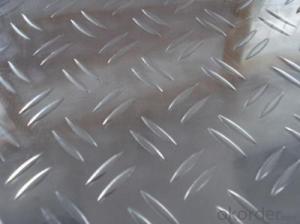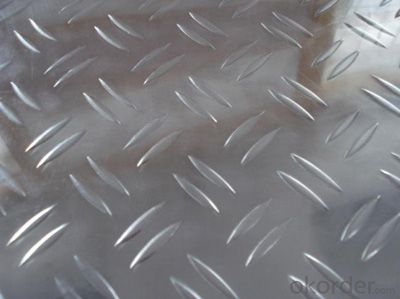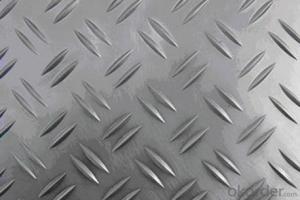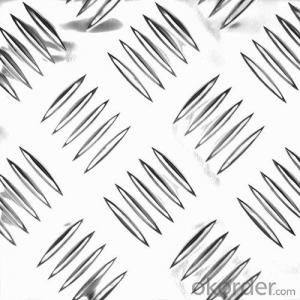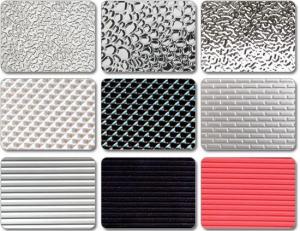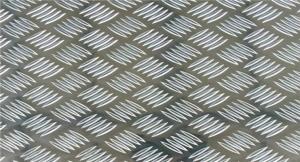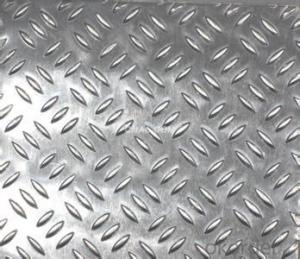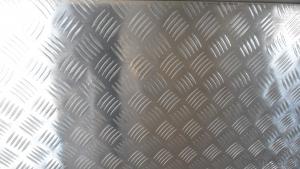Coil of Aluminum Checkered Sheet - Two Bars
- Loading Port:
- China Main Port
- Payment Terms:
- TT OR LC
- Min Order Qty:
- -
- Supply Capability:
- -
OKorder Service Pledge
OKorder Financial Service
You Might Also Like
Product Description:
1. Specifications of Aluminum Checkered Sheet
| MAIN SPECIFICATION OF ALUMINUM CHECKERED SHEET | |
| Alloy | AA1XXX (AA1050, AA1060, AA1070, AA1100 etc.) |
| AA3XXX (AA3003, AA3004, AA3005, AA3105 etc.) | |
| AA5XXX(AA5052) | |
| | |
| Temper | H14,H18,H24, H26, H32 |
| Thickness | 0.2mm-100mm |
| Width | 30mm-1700mm |
| Standard | GB/T 3880-2006 |
| Special specification is available on customer's requirement | |
2. Usage/Applications of Aluminum Checkered Sheet
The embossed aluminum sheet are widely used for decorative purposes in construction, packing and appliance. It is also very commonly used for anti-splippery purposes in vehicles and public places.
3. Packing & Delivery of Aluminum Checkered Sheet
Packaging: Seaworth package
Shipment: The goods will be delivered in not more than 40 days after getting the buyer's payment.
- Q: Can aluminum coils be used for gutter systems?
- Yes, aluminum coils can be used for gutter systems. Aluminum is a popular choice for gutters due to its lightweight nature, durability, and resistance to rust and corrosion. It is also easy to shape and install, making it a suitable material for gutter systems.
- Q: Can aluminum coils be used for electrical transmission lines?
- Aluminum coils find common use in electrical transmission lines due to their numerous advantages. Firstly, aluminum, being a lightweight material, facilitates easier and more cost-effective transportation and installation. Secondly, aluminum exhibits good electrical conductivity, comparable to that of copper. Thirdly, aluminum proves to be a more economical choice for long-distance transmission lines, as it is less expensive than copper. Nonetheless, there are certain challenges associated with employing aluminum coils in transmission lines. Notably, aluminum possesses a lower tensile strength than copper, rendering it more susceptible to sagging over extended distances. Moreover, aluminum boasts a higher thermal expansion coefficient than copper, potentially giving rise to complications related to thermal expansion and contraction. Nevertheless, through proper design and engineering, aluminum coils can be effectively and efficiently utilized in electrical transmission lines.
- Q: Why 5052 turn black after annealing during the production of aluminum alloy?
- It has been sooted.
- Q: What are the potential drawbacks or limitations of using aluminum coils?
- Using aluminum coils has several potential drawbacks and limitations. Firstly, aluminum is a softer metal compared to materials like copper or steel, making the coils more susceptible to damage such as denting or bending, especially in high-impact environments. Additionally, aluminum is prone to corrosion, especially in harsh or corrosive surroundings, which can negatively affect the coils' performance and lifespan. Another limitation of aluminum coils is their lower thermal conductivity in comparison to copper coils. This means that aluminum coils may not transfer heat as efficiently, resulting in decreased cooling or heating performance in certain applications. Moreover, the lower thermal conductivity may lead to higher energy consumption as the system needs to work harder to achieve the desired temperature. Furthermore, when aluminum coils are used in HVAC systems, compatibility issues can arise with specific refrigerants. Aluminum can react with certain refrigerants, causing corrosion or other chemical reactions that could compromise the coils' performance and longevity. Therefore, careful consideration and compatibility testing are necessary when selecting a refrigerant to use with aluminum coils. Lastly, the cost of aluminum coils can be higher compared to other coil materials. Although aluminum itself is relatively inexpensive, the manufacturing process for aluminum coils can be more complex and costly, impacting the overall product cost. Despite these drawbacks, aluminum coils are still widely utilized in various industries due to their lightweight nature, good electrical conductivity, and resistance to certain types of corrosion. However, it is crucial to thoroughly evaluate the specific application, environment, and requirements before choosing aluminum coils to ensure they are the most suitable option.
- Q: A magnet will not attract a aluminum bar, but if you have an electromagnetic field made by an transformer it will interact.Why is that?Why iron is attracted and wood is not?
- Aluminum is not a magnetic material and will not be affected by stationary magnets. However, if a changing magnetic field is present, an electrical voltage will be induced in the aluminum ring and an electric current will flow as a result. This current will produce a magnetic field which will interact with the externally produced magnetic field. The key here is a changing magnetic field - because the voltage induced in the aluminum ring will be proportional to the rate of change of the field. If an aluminum disk is passed between the poles of a powerful magnet, eddy currents will be induced in the aluminum producing a magnetic field that will tend to retard the motion of the aluminum relative to the magnet. The changing field in this case is due to the motion of the aluminum. Iron is attracted to a magnetic field because it is a ferro-magnetic material. Wood is not a magnetic material, and it is not an electrical conductor, so it will not behave as aluminum does in a magnetic field.
- Q: Are aluminum coils suitable for use in heating applications?
- <p>Yes, aluminum coils can be used for heating. They are known for their excellent thermal conductivity, which allows for efficient heat transfer. Aluminum's lightweight nature and resistance to corrosion make it a popular choice in various heating applications, such as in electric heating elements, heat exchangers, and cookware. However, it's important to note that aluminum's low melting point means it's not suitable for high-temperature applications and should be used within safe temperature limits to prevent melting or damage.</p>
- Q: This question asks for an explanation of the distinctions among various grades of hot rolled aluminum coils, focusing on their characteristics and applications.
- <p>Different grades of hot rolled aluminum coils are distinguished by their chemical composition, mechanical properties, and applications. Grades like 1000 series are pure aluminum with high ductility and electrical conductivity, suitable for general purposes. 3000 series, with added manganese, offer moderate strength and are used in cooking utensils and chemical equipment. 5000 series, containing magnesium, are strong and corrosion-resistant, used in marine applications and aerospace. 6000 series, with silicon and magnesium, are known for their mechanical strength and are used in construction and automotive parts. Each grade has specific alloying elements that tailor its properties for different industrial needs.</p>
- Q: Can aluminum coils be used in solar energy systems?
- Certainly, solar energy systems can utilize aluminum coils. Aluminum is widely employed in the fabrication of solar panels and solar energy systems owing to its remarkable qualities. Lightweight, durable, and possessing excellent thermal conductivity, aluminum coils are perfect for dispersing heat away from solar cells. Moreover, aluminum's resistance to corrosion is essential for outdoor deployments, where solar panels face diverse weather conditions. By incorporating aluminum coils into solar energy systems, the efficiency and lifespan of the panels are enhanced, thus augmenting the efficacy and sustainability of solar energy generation.
- Q: Yep a slogan...the element Aluminum
- Aluminum: It's Shiny in paper form, yo!
- Q: How can you tell the difference between aluminum and other non-magnetic metals, such as what I've heard called, pot-metal?
- Well there's many ways to do this but I would think the easiest way would be to weigh the two metals and aluminum will be lighter.
Send your message to us
Coil of Aluminum Checkered Sheet - Two Bars
- Loading Port:
- China Main Port
- Payment Terms:
- TT OR LC
- Min Order Qty:
- -
- Supply Capability:
- -
OKorder Service Pledge
OKorder Financial Service
Similar products
Hot products
Hot Searches
Related keywords
